INSPECT AIR FUEL RATIO SENSOR (HEATER RESISTANCE)
CHECK HARNESS AND CONNECTOR (A/F SENSOR - ECM, A/F SENSOR - A/F HTR RELAY)
DTC P0031 Oxygen (A/F) Sensor Heater Control Circuit Low (Bank 1 Sensor 1) |
DTC P0032 Oxygen (A/F) Sensor Heater Control Circuit High (Bank 1 Sensor 1) |
DTC P0051 Oxygen (A/F) Sensor Heater Control Circuit Low (Bank 2 Sensor 1) |
DTC P0052 Oxygen (A/F) Sensor Heater Control Circuit High (Bank 2 Sensor 1) |
DESCRIPTION
- HINT:
- Although the DTC titles say oxygen sensor, these DTCs relate to the Air-Fuel Ratio (A/F) sensor.
- Sensor 1 refers to the sensor mounted in front of the Three-Way Catalytic Converter (TWC) and located near the engine assembly.
The A/F sensor is the planar type and is integrated with the heater, which heats the solid electrolyte (zirconia element). This heater is controlled by the ECM. When the intake air volume is low (the exhaust gas temperature is low), a current flows into the heater to heat the sensor, in order to facilitate accurate oxygen concentration detection. In addition, the sensor and heater portions are narrower than the conventional type. The heat generated by the heater is conducted to the solid electrolyte though the alumina, therefore the sensor activation is accelerated.
In order to obtain a high purification rate of the carbon monoxide (CO), hydrocarbon (HC) and nitrogen oxide (NOx) components in the exhaust gas, a TWC is used. For the most efficient use of the TWC, the air-fuel ratio must be precisely controlled so that it is always close to the stoichiometric level.
*: Value changes inside the ECM. Since the A/F sensor is the current output element, a current is converted to a voltage inside the ECM. Any measurements taken at the A/F sensor or ECM connectors will show a constant voltage.

- HINT:
- When any of these DTCs are set, the ECM enters fail-safe mode. The ECM turns off the A/F sensor heater in fail-safe mode. Fail-safe mode continues until the engine switch is turned off.
- The ECM provides a pulse width modulated control circuit to adjust the current through the heater. The A/F sensor heater circuit uses a relay on the B+ side of the circuit.

| DTC No. | DTC Detection Condition | Trouble Area |
| P0031 P0051 | Air-Fuel Ratio (A/F) sensor heater (bank 1 sensor 1) current less than 0.8 A (1 trip detection logic) |
|
| P0032 P0052 | Air-Fuel Ratio (A/F) sensor heater (bank 2 sensor 1) current more than 10 A (1 trip detection logic) |
|
- HINT:
- Bank 1 refers to the bank that includes cylinder No. 1.
- Bank 2 refers to the bank that does not include cylinder No. 1.
- Sensor 1 refers to the sensor closest to the engine assembly.
- Sensor 2 refers to the sensor farthest away from the engine assembly.
WIRING DIAGRAM
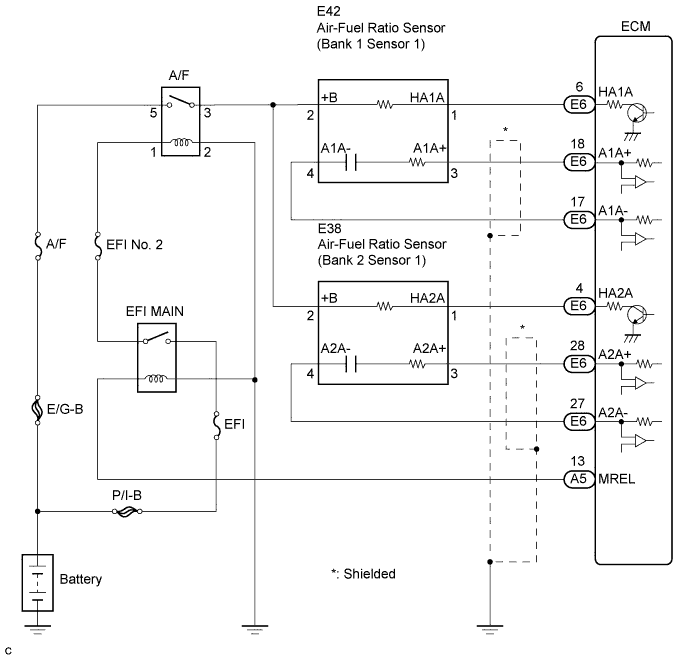
INSPECTION PROCEDURE
- HINT:
- Read freeze frame data using the intelligent tester. Freeze frame data records the engine conditions when malfunctions are detected. When troubleshooting, freeze frame data can help determine if the vehicle was running or stopped, if the engine was warmed up or not, if the air-fuel ratio was lean or rich, and other data from the time the malfunction occurred (Click here).
| 1.INSPECT AIR FUEL RATIO SENSOR (HEATER RESISTANCE) |
Disconnect the E42 or E38 A/F sensor connector.
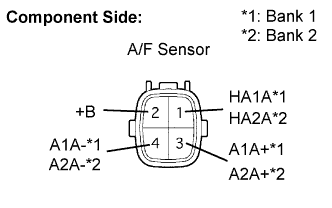 |
Measure the resistance of the A/F sensor connector.
- Standard resistance (Bank 1 sensor 1):
Tester Connection Condition Specified Condition HA1A (1) - +B (2) 20°C (68°F) 1.8 to 3.4 Ω HA1A (1) - A1A- (4) - 10 kΩ or higher
- Standard resistance (Bank 2 sensor 1):
Tester Connection Condition Specified Condition HA2A (1) - +B (2) 20°C (68°F) 1.8 to 3.4 Ω HA2A (1) - A2A- (4) - 10 kΩ or higher
Reconnect the A/F sensor connector.
|
| ||||
| OK | |
| 2.INSPECT A/F HTR RELAY |
Remove the A/F HTR relay from the engine room J/B and R/B No. 2.
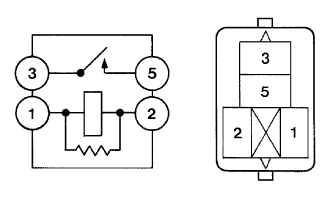 |
Measure the resistance of the A/F HTR relay.
- Standard resistance:
Tester Connection Specified Condition 3 - 5 10 kΩ or higher 3 - 5 Below 1 Ω
(when battery voltage applied to terminals 1 and 2)
Reinstall the A/F HTR relay.
|
| ||||
| OK | |
| 3.INSPECT ECM |
Turn the engine switch on (IG).
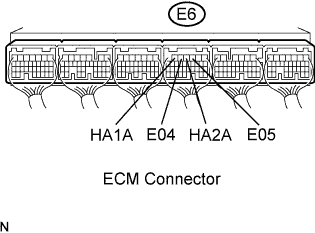 |
Measure the voltage of the E6 ECM connector.
- Standard voltage:
Tester Connection Specified Condition HA1A (E6-6) - E04 (E6-5) 9 to 14 V HA2A (E6-4) - E05 (E6-3) 9 to 14 V
- HINT:
- The HA1A means the A/F sensor bank 1 sensor 1.
- The HA2A means the A/F sensor bank 2 sensor 1.
|
| ||||
| NG | |
| 4.CHECK HARNESS AND CONNECTOR (A/F SENSOR - ECM, A/F SENSOR - A/F HTR RELAY) |
Check the wire harness and the connector between the ECM and the A/F sensor ECM and body ground.
Disconnect the E42 or E38 A/F sensor connector.
Disconnect the E6 ECM connector.
Measure the resistance of the wire harness side connector.
- Standard resistance (Check for open):
Tester Connection Specified Condition HA1A (E42-1) - HA1A (E6-6) Below 1 Ω HA2A (E38-1) - HA2A (E6-4) Below 1 Ω E04 (E6-5) - Body ground Below 1 Ω E05 (E6-3) - Body ground Below 1 Ω
- Standard resistance (Check for short):
Tester Connection Specified Condition HA1A (E42-1) or HA1A (E6-6) - Body ground 10 kΩ or higher HA2A (E38-1) or HA2A (E6-4) - Body ground 10 kΩ or higher
Reconnect the A/F sensor connector.
Reconnect the ECM connector.
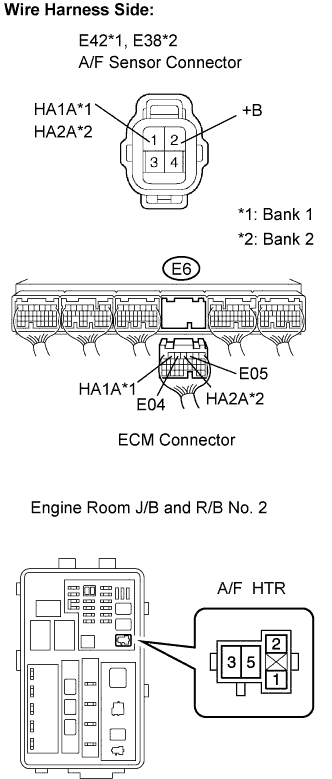 |
Check the wire harness and the connector between the A/F sensor and A/F HTR relay.
Disconnect the E42 or E38 A/F sensor connector.
Remove the A/F HTR relay from the engine room J/B and R/B No. 2.
Measure the resistance of the wire harness side connector.
- Standard resistance (Check for open):
Tester Connection Specified Condition +B (E42-2) - A/F HTR relay (3) Below 1 Ω +B (E38-2) - A/F HTR relay (3) Below 1 Ω
- Standard resistance (Check for short):
Tester Connection Specified Condition +B (E42-2) or A/F HTR relay (3) - Body ground 10 kΩ or higher +B (E38-2) or A/F HTR relay (3) - Body ground 10 kΩ or higher
Reconnect the A/F sensor connector.
Reinstall the A/F HTR relay.
|
| ||||
| OK | ||
| ||